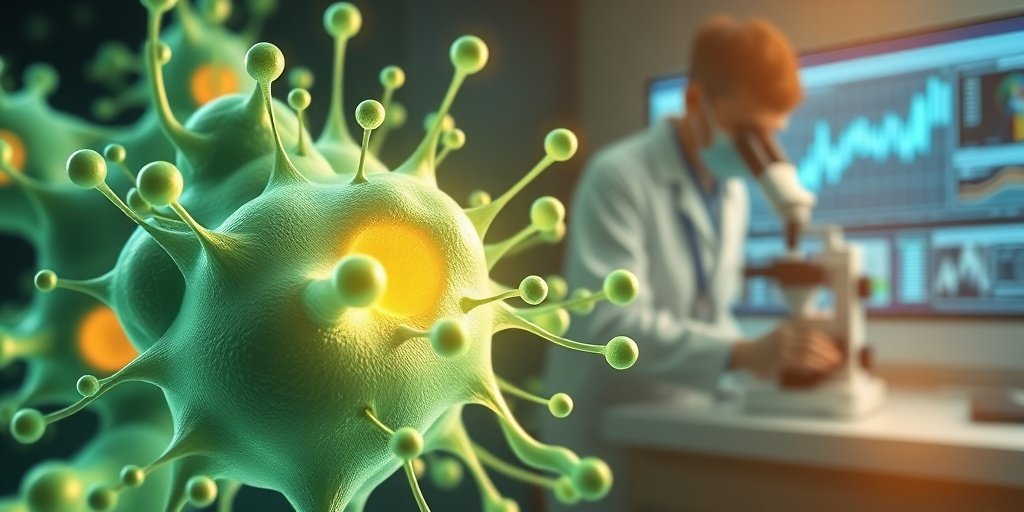⚡ Quick Summary
This review explores the potential of nanoparticle-based drug delivery systems in treating anxiety disorders, addressing challenges such as delayed action and side effects. It highlights the integration of precision medicine and artificial intelligence in developing targeted therapies for improved patient outcomes. 🌟
🔍 Key Details
- 🧬 Focus: Nanoparticle-mediated drug delivery for anxiety treatment
- 💡 Types of nanoparticles: Lipid-based, polymeric-metallic, and responsive nanoparticles
- ⚙️ Approach: Precision medicine tailored to individual genetic and lifestyle factors
- 🤖 Technology: Integration of artificial intelligence in nanoparticle formulations
- ⚠️ Challenges: Toxicity, regulatory hurdles, and scalability issues
🔑 Key Takeaways
- 🌐 Nanoparticle systems can enhance drug bioavailability and target specific brain regions.
- ⏳ Controlled release offers sustained action, addressing the issue of delayed therapeutic effects.
- 🧬 Precision medicine allows for personalized treatment based on individual characteristics.
- 🤖 AI integration is paving the way for smarter nanoparticle formulations.
- ⚠️ Future research must address toxicity and regulatory challenges to ensure safety and efficacy.
- 🌱 Biodegradable nanoparticles are highlighted as a promising direction for future development.
- 📈 Enhanced patient compliance is a key goal of these innovative therapies.

📚 Background
Anxiety disorders are prevalent mental health conditions that often require effective therapeutic strategies. Traditional pharmacological treatments can be limited by side effects and poor patient compliance. The emergence of nanomedicine offers a new avenue for improving treatment outcomes through targeted drug delivery systems that enhance precision and reduce adverse effects.
🗒️ Study
The review conducted by Singh et al. examines various types of nanoparticles and their applications in anxiety medication. It emphasizes the importance of precision medicine in tailoring treatments to individual patients, considering their unique genetic, environmental, and lifestyle factors. The integration of artificial intelligence into nanoparticle design is also explored, showcasing its potential to revolutionize treatment approaches.
📈 Results
The findings suggest that nanoparticle-based therapies can significantly improve drug delivery efficiency and therapeutic outcomes for anxiety disorders. By enhancing drug bioavailability and enabling targeted action, these systems can potentially overcome the limitations of traditional treatments. The review also highlights the need for ongoing research to address challenges related to toxicity and regulatory compliance.
🌍 Impact and Implications
The implications of this research are profound, as it points towards a future where anxiety treatments are not only more effective but also personalized. The integration of AI and biodegradable nanoparticles could lead to safer, more efficient therapies that improve patient adherence and overall mental health outcomes. This innovative approach could reshape the landscape of anxiety treatment and enhance the quality of life for many individuals. 🌈
🔮 Conclusion
This review underscores the transformative potential of precision nanomedicine in addressing anxiety disorders. By leveraging advanced drug delivery systems and personalized treatment strategies, we can pave the way for more effective and patient-friendly therapies. The future of anxiety treatment looks promising, and continued research in this field is essential for unlocking its full potential. 🚀
💬 Your comments
What are your thoughts on the role of nanomedicine in treating anxiety? We would love to hear your insights! 💬 Share your comments below or connect with us on social media:
Precision nanomedicine for anxiety: challenges, opportunities, and future directions in targeted drug delivery.
Abstract
Nanoparticle-based drug delivery system represents one of the challenging strategies suggested to improve anxiety disorder therapeutic approaches, clinic challenges of delayed action, side effect-free designing and poor patient compliance. Traditional pharmacological agents can increase drug bioavailability and target specific brain regions, whereas nanoparticle-mediated controlled release offers enhanced precision and sustained action. The others in this review concentrate on several kinds of nanoparticle, including lipid-based, polymeric-metallic, and responsive nanoparticles, their use in anxiety medication. In addition, emphasis is placed on precision medicine that pertain the delivery of treatment based on an individual’s genetic, environmental and lifestyle aspects. Also, it is looked into how artificial intelligence is being integrated into personalized nanoparticle formulations. Toxicity, regulatory hurdles and scalability are briefly discussed and future directions on smart and biodegradable nanoparticles are underlined. The present review highlights advantages of nanoparticle treatments and outlines a future direction of precision nanomedicine for anxiety.
Author: [‘Singh S’, ‘Singh A’, ‘Chittu S’, ‘Sharma S’]
Journal: J Food Drug Anal
Citation: Singh S, et al. Precision nanomedicine for anxiety: challenges, opportunities, and future directions in targeted drug delivery. Precision nanomedicine for anxiety: challenges, opportunities, and future directions in targeted drug delivery. 2025; 33:241-251. doi: 10.38212/2224-6614.3556